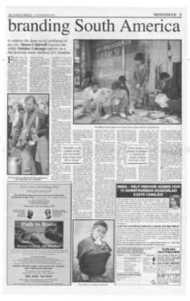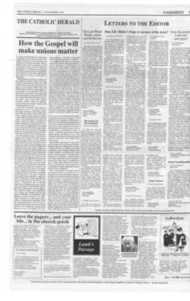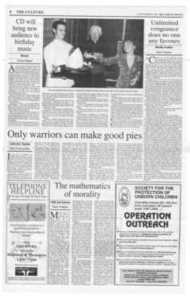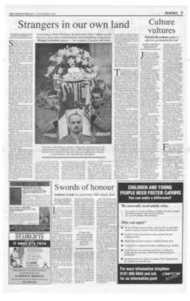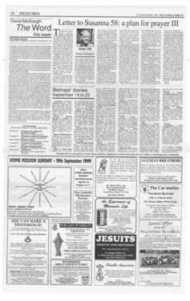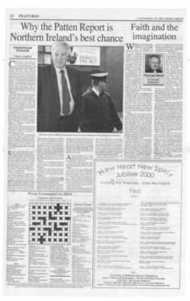Page 9, 17th September 1999
Page 9

Report an error
Noticed an error on this page?If you've noticed an error in this article please click here to report it.
Tags
Share
Related articles
‘it’s Bolshevism For The Home Counties’
The Anti-conservative Culture
Filling The God-shaped Hole With Psychobabble And Angry...
Comment By Peter Hitchens
Honors And Sublimity
Strangers in our own land
According to Peter Hitchens, Britain under New Labour is torn between soap-opera sentimentality and unthinking iconoclasm. Margot Lawrence agrees — but wonders if people will listen
The Abolition of Britain by Peter Hitchens, Quartet Books £15
S0 MUCH HAS CHANGED in Britain since the Second World War that millions of people now feel strangers in their own land. So claims Peter Hitchens, who sets out in this challenging book to ask how it all happened and if there is any remedy. Can we turn back the clock? It is a theme that has already prompted one left-wing reviewer to spitting fury. The reader is likely to either love or loathe Hitchens's analysis of Britain today.
A media journalist of around 30 years experience, he makes a good start by contrasting the public reaction to the dignified funeral of Churchill in 1965 with that of Diana two years ago. The death of the princess actually widened the gap between the old culture and the new, he argues. Those brought up in the older tradition were astonished and shocked to hear pop songs and applause at a funeral, to see mourners who wept but also took photos. Those who grew up in the new tradition were puzzled and annoyed by the restraint and self-discipline shown by the other half of the nation and believed that this indicated a real failure of feeling. Of this era in general, Hitchens says that the remnants of Edwardian confidence and Victorian religious faith were losing their power to influence the British people.
His career has taken him to Soviet Russia and the USA among other overseas postings, and he has come to believe that the nation state is the most reliable guarantee of solidarity and public spirit; also that the best assurance of human liberty when assailed by earthly powers, is the family. (The history of the Jews, in fact, though Hitchens does not say so, fully bears out this last point.) Yet much of British policy in the last three decades, whether by accident or design, has been to diminish the influence of the family and run down the nation state.
Many of the developments he deplores, starting from the Lady Chatterley trial and the Obscene Publications Act and including changes in marriage and abortion law, toleration of homosexuality and single-parent families, were carefully planned by left-wing politicians, and he names and blames certain hate figures.
I am not convinced that it was indeed all a deliberately planned change. I remember that brilliant journalist and highly principled MP, the late Charles Curran, a devout Catholic, saying remorsefully over a dinner in the late Sixties that the increased flood of divorce had been released when Parliament voted to extend legal aid to civil cases as well as criminal ones. "We simply did not anticipate this result, or how many people would take advantage of legal aid to apply for divorce," he said sadly. Did anyone? Perhaps the law of unintended results has operated more widely than anyone could have foreseen. It seemed to many in the early days of the welfare state that it was a humane provision to give child allowance directly to the mother. No doubt it would have been judged politically impossible. rigid and judgmental to limit this to married mothers. But the result was to give serious encouragement to illegitimacy and the marginalising of the family. Peter Hitchens believes all this and much else was not only foreseen, but deliberately intended.
Some years ago I heard an elderly retired bishop say the biggest change affecting the Church in his lifetime was the breakdown of the old-style village life. This, of course, has affected much more than the Church. It seems to me that the deliberate actions of the Left to destroy the land-owning classes through penal
taxation have, as it were, destroyed the brakes on change.
Older societies had a vested interest in stability. One big disadvantage of the meritocratic society is that nobody rises within it without making an impact through introducing change: just carrying on the arrangements set in place by your predecessors does not bring either recognition or promotion. So change is now endemic, a built-in feature of modern life, with villages and the countryside wrecked not only by huge new building projects but also by young folk leaving in search of something "better".
The 20th century is the first in history that seems consciously to prefer the merely modish to the classical and lasting features of life, says Hitchens. This is probably due to the influence of the media making us all acutely aware, all the time, of "the very latest thing". Thus a high level of family breakdown is tolerated, the sexual affairs of those in the public eye are paraded before us and TV and the media are able, with little public protest, to denigrate and ridicule once cherished institutions.
THE CONTRACEPTIVE PILL had an immeasurable result in changing public morality by making casual sex, because devoid of consequences, seem
acceptable and "not sinful" to large numbers of unthinking people. Hitchens might have mentioned the influence of "agony aunts" such as the late Marje Proops, whose deliberately non-judgmental attitude influenced millions of teenagers.
He rightly castigates the computer games culture, quoting the US author Neil Postman, author of The Disappearance of Childhood, on how television is changing children's lives. TV and computer games "hand children the fruit of the tree of knowledge unmediated by adult wisdom; we have abandoned our young to powers and influences we cannot control and whose strength we do not know".
Hitchens believes that a "people who spoke the tongue and held the faith of Shakespeare and Milton could never have submitted to the hamburger-and-soap-opera culture
which now has the British working.:
class in it greasy grip". But the teaching of history and English in schools has largely and deliberately been geared to separating the British from their roots. "To anyone brought up when English literature, scripture, poetry and hymns were still taught, it is astonishing to find how little they have in common with the post-revolutionary culture."
The Church of England comes under detailed and heavy criticism: the fear of hell has been abolished, the Ten Commandments never now taught, the traditional and beautiful liturgy rubbished, while the state takeover of education has meant the Churches have lost their grip on schools. Hitchens might perhaps have mentioned here the liberalising effect on many Churches well outside the confines of the Catholicism itself of the Second Vatican Council. Increasingly, we are all influenced by a social theology in which Christian charity to one's neighbour is expressed in political rather than personal conduct.
Wherever one looks, British values are thrown away. Is it still possible to reverse the trends that have brought us to this pass? Hitchens believes it is — if only enough of the nation can be brought to see things his way.
blog comments powered by Disqus






